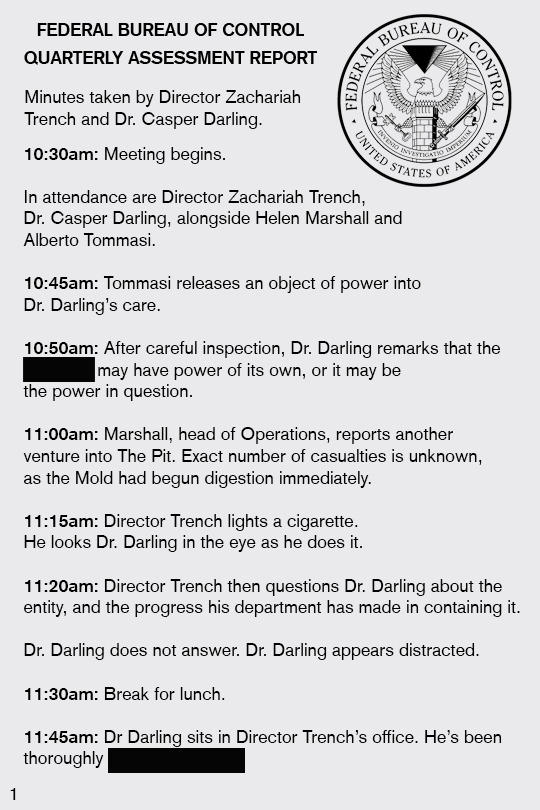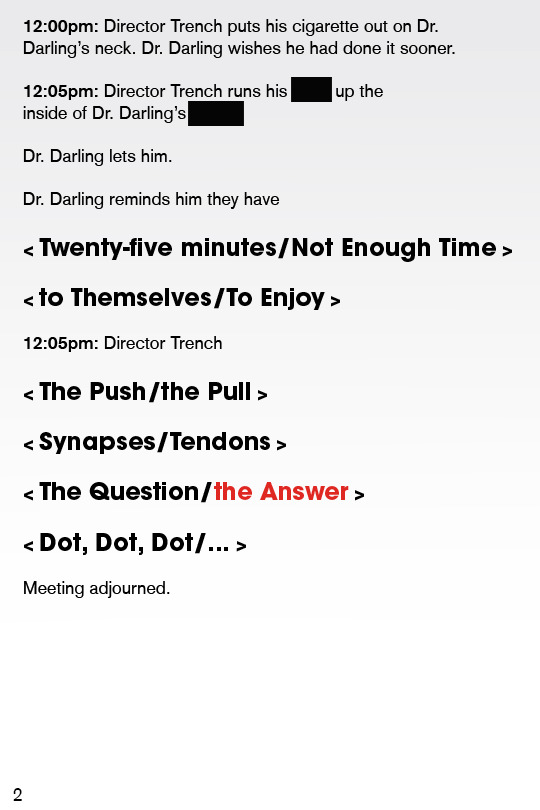#PAINSTAKINGLY METICULOUSLY PUT THIS TOGETHER. I FEEL VERY OFFICIAL :^)
Text


minutes of the meeting
a control fic
“Dr. Darling,” Trench murmurs, “appears distracted.”
Darling thins his lips. He’s anything but distracted, now; his eyes had held Trench’s the whole time the Director had been speaking.
“You forgot a point,” he responds, carefully, at the same volume.
“Did I.”
“11:15am: Director Trench lights a cigarette.” A pause. “He looks Dr. Darling in the eye as he does it.”
Trench considers this. He hums--the sound rumbles in the back of his throat.
“So you were paying attention.”
“To all the wrong things, maybe.”
--
a trench/darling fic about the path that had been laid out for trench, 23 years in the making.
i haven't even finished this game but those two old men are haunting me. there is something deeply wrong with the both of them and i think they can only see that through the eyes of the other.
image descriptions and transcript under the cut
[id: the post contains two images of the same size. the first image has a light gray background. on the left side of the page, the words "federal bureau of control" are printed in bold, black letters. underneath it is "quarterly assessment" in the same style.
on the right side of the page is the logo of the federal bureau of control from the game control.
transcript begins:
10:30am: Meeting begins.
In attendance are Director Zachariah Trench, Dr. Casper Darling, alongside Helen Marshall and Alberto Tommasi. The meeting had been called to assess each department’s quarterly status.
10:45am: Tommasi releases an object of power into Dr. Darling’s care.
10:50am: After careful inspection, Dr. Darling remarks that the (here, the text is obscured by a black rectangle) may have power of its own, or it may be the power in question.
11:00am: Marshall, head of Operations, reports another venture into The Pit. Exact number of casualties is unknown, as the Mold had begun digestion immediately.
11:15; Director Trench lights a cigarette. He looks Dr. Darling in the eye as he does it.
11:20am: Director Trench then questions Dr. Darling about the entity, and the progress his department has made in containing it.
Dr. Darling does not answer. Dr. Darling appears distracted.
11:30am: Break for lunch.
11:45am: Dr Darling sits in Director Trench’s office. He’s been thoroughly (another black rectangle censors the text).
on the bottom left of the image is the number 1, denoting the page number.
end transcript and id]
[id of page 2: the second image is the same shade of light gray as the first.
transcript begins:
12:00pm: Director Trench puts his cigarette out on Dr. Darling’s neck. Dr. Darling wishes he had done it sooner.
12:05pm: Director Trench runs his (text is obscured) up the inside of Dr. Darling’s (text is obscured).
Dr. Darling lets him.
Dr. Darling reminds him they have
the font changes to bigger, bolder text. the page's gray color turns white in a gradient. each sentence that follows is enclosed in angle brackets.
Twenty-five Minutes/Not Enough Time
to Themselves/To Enjoy
12:05pm: Director Trench
The Push/the Pull
Synapses/Tendons
The Question/(text in red) The Answer
1:00pm:
Dot, Dot, Dot/...
The font returns to its original style.
Meeting adjourned.
end transcript and id]
#control game#control#dr casper darling#casper darling#director trench#director zachariah trench#digital art#artists on tumblr#trench/darling#fanfiction#fanfic#writing#mine#my writing#my art#PAINSTAKINGLY METICULOUSLY PUT THIS TOGETHER. I FEEL VERY OFFICIAL :^)#anyway like comment subscribe#and do let me know if the id's and transcripts r ok
62 notes
·
View notes
Text
Centre Stage
As a child, I had an unusual obsession with comedy on TV. I wouldn't just watch it, I'd record whatever was on offer onto a series of grainy VHS tapes, whenever it was available, and spend most evenings after school re-watching everything multiple times until I could quote every single line before the performers would say it themselves. Despite this passion, which would later expand into a rounded love of sketch, stand-up, improv and everything in-between, an apathy and inability for high-school drama (the subject, not the extra-curricular stuff in the cafeteria) had always led me to believe it wasn't really a viable option to give it a go myself. It took until I was twenty-eight and living in Melbourne before I took my first foray into performance, by learning improv. Five festival seasons and dozens of weekly shows with The Big Hoo-Haa later, I had finally convinced myself that I should take some tentative steps towards giving stand-up comedy a try. Instead of following the established route, and testing the water with some five-minute open mic spots to tiny audiences somewhere above a pub, I booked myself an eleven-night run at Melbourne International Comedy Festival 2017, the third-biggest comedy festival in the world. When describing this to Stuart Goldsmith, a British full-time stand-up and creator of heavily-influential podcast, "The Comedian's Comedian", he described it as a 'truly ludicrous endeavour'. Sounds promising.
The show I had created was a passion project born out of sheer disillusionment with two things. Firstly, the frankly depressing political landscape we found ourselves in, in a post-Trump, post-Brexit, post-Turnbull, post-truth world, and secondly, the lack of nuance and awareness shown by a huge amount of people when trying to push their points within their own little social media 'bubble'. The concept and format of "The Echo Chamber" was swiftly devised in late 2016 and the material was hammered out over the next eight months. In hindsight, I wrote far too much (nearly half of the jokes and research were jettisoned for time reasons in the week leading up to the show, with further edits being made on the fly), but it was a hell of a worthwhile experience. I only had a single haunting, sleep-deprived crisis of confidence during the creative process, so I'm chalking that up as a win.
The first time I would ever step onto a stage to perform solo stand-up was 10:00pm on Monday 3rd April 2017. At 8:30pm, while sitting in a local Starbucks fine-tuning the 475-page PowerPoint presentation which would be a constant and crucial accompaniment to the show, it decided to malfunction. Inexplicably, around half of the pictures simply disappeared, and a few of the links from one slide to the next (an important part of the fluid and audience-directed narrative I'd put together) were now pointing at the wrong place. I did have a backup, but since the editing process had been a regular, ongoing thing to make improvements after each rehearsal and keep the show as topical as possible, it would not have been any quicker to go back to the old version. So instead of spending the hour leading up to my debut casually going over my material or doing breathing exercises to get in the zone, I burst into the office at The Butterfly Club and frantically tried to patch the file together as best as I could, all while Jak and Craig (my tech and venue manager, respectively) rushed around generously setting up the stage for me, and Liam, another tech, affectionately patted me on the back. The show must go on, and in front of a sizeable audience - including many of my Big Hoo-Haa colleagues and several friends and acquaintances who had supportively shown up on opening night - I stammered through an absolute disaster. Visual jokes were in the wrong place, I missed several cues and callbacks, and I nervously expanded on some talking points for far too long, meaning I not only ran over my allotted time, but had to skip the crucial final routine that tied the whole purpose of the show together. Stuff of legendary folklore, this was not.
After an extended post-mortem (with several people patiently waiting around afterwards to 'celebrate' my achievement with me, even though interacting with people whose opinion I respect was not something I wanted to do, at that time), I spent the following day meticulously putting the show back together. The Tuesday night performance was delivered to a grand total of three people, and so even though I felt delighted and fulfilled that everything had now been performed as intended, I still went to sleep with a slight sense of missed opportunity, since now I felt sure the show was actually really good, but most people had seen an inferior mess. This malaise lasted only until Wednesday lunchtime, when I discovered that one of said three attendees had been a critic for the official MICF web site, and had swiftly stuck up a gushing, complimentary five-star review. In one fell swoop, the years of devouring comedy and learning to perform, and the months of painstakingly putting together a tenuous piece of art suddenly all felt vindicated. I'd not felt so proud since I got my GCSE results.
The following nine performances breezed past in a nearly identical manner; poorly-attended but confidently-performed and really well-received, with another great review appearing later on. Highlights included the night when my front row was made up of elderly Dutch women who spoke to me at length afterwards about how much they hated Geert Wilders, the night a vocal UKIP-supporting Scot started heckling during and after the show only to be restrained by his friend, grinning from ear-to-ear, and the night when nine of my good mates from 'outside' of the comedy scene came to watch and sat in appreciative, stunned near-silence afterwards, repeatedly exclaiming, "but, man, I mean, seriously, that was genuinely really good, wasn't it?". By the fifth show, I'd already got so comfortable that I was adding in new slides and jokes most nights, depending on what relevant stuff had been in the news that day, and even though I was enjoying the hour of performing each night I remarked to Jak that I'd quickly realised how spoiled I'd been by the vitality and urgency of improv, because it just wasn't quite as interesting saying much the same stuff every day. I think that has to mark the quickest trajectory from 'lifelong dream' to 'jaded by the constant monotony' of all time.
The atmosphere of the festival was by far the most enjoyable I'd ever experienced. It was surely helped by the fact I'd also taken some time off work to concentrate on my run, but there was also a exciting, albeit pathetically uncool, feeling of being legitimately part of the crowd at the nightly 'Festival Club', and catching up with the same faces most nights to share stories. As always, I tried to squeeze in watching as many shows as possible, and despite being far too busy to reach the heights of the seventy-three I saw in 2016, I still managed a highly-respectable forty-seven. I was particularly impressed with the quality of the improv and sketch on offer this year, and the avant-garde shows from Tom Walker, Cam Venn, Richard Gadd and Sammy J were all very memorable. There was also the annual chance for me to become starstruck by joining in the soccer game with many of the pros from overseas, and joining Steen Raskopoulos, Guy Montgomery and David O'Doherty from last year were the likes of James Acaster and Loyiso Gola. Who knows, maybe in a few years somebody else will be blogging about the pleasure of being able to play a match alongside festival veteran Paul Richards?
0 notes